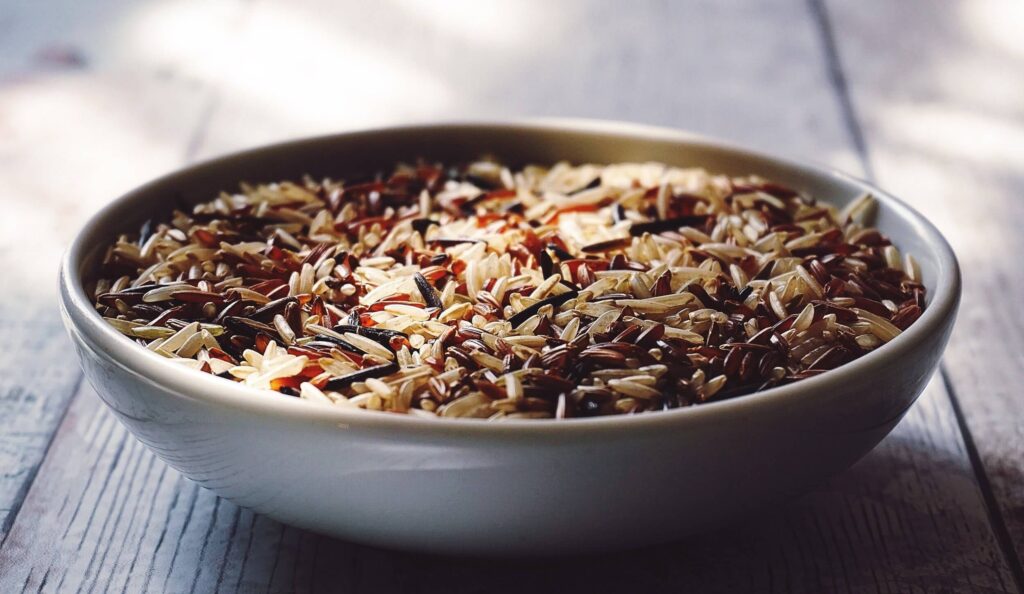Introduction
Did you know that hunter-gatherers have been known to consume 100 gms of fibre a day from seasonal food sources, as opposed to westerners who barely eat about 15 gms of fibre per day? Case in point: the Hazda community residing in Tanzania (one of the world’s last remaining hunter-gatherer communities) whose diet comprises fibre-rich tubers, berries, and wild meat. Studies have found that they have more diverse and richer gut microbiomes than westerners. When we eat, we are also feeding the countless microbes in our gut. Fibre-rich MACs or microbiota accessible carbohydrates are their favoured diet. Let’s explore in more detail what MACs are, how they’re beneficial to our health and how we can incorporate them more into our diets. Research shows that consumption of even a little more than 5g of fibre every day can be conducive to the growth of beneficial Bifidobacterium spp (good bacteria).
What are MACs/MAC foods?
Microbiota-accessible carbohydrates (MACs) are complex carbohydrates resistant to digestion by a human body’s metabolism. They are made available to gut microbes as prebiotics (compounds in food that promote the growth of beneficial bacteria or fungi) for fermenting or metabolising into beneficial compounds, such as short-chain fatty acids, which contain less than 6 carbon atoms, making them crucial to gut health.
MACs can also be referred to as fermentable fibres and indigestible short-chain carbohydrates. MACs are generally metabolized by the microbiome and can be derived from animal tissues, food-borne microbes and fungi. Beans, firm bananas, potatoes, pasta and rice that have been cooked and cooled, and the resistant starch found in lentils, all contain MACs. Many vegetables, fruits, legumes and whole grains, including oat, barley and other soluble fibre, also contain MACs. Consuming a broad range of MACs helps enrich a person’s microbiota. The deceptively simple process of fermentation plays a critical role in the health of the gut, immune function, controlling blood glucose & cholesterol levels and the gut-brain connection. A balanced diet with enough variety of MACs supports a healthy gut by promoting the activity of a diverse range of microorganisms, which is key for good health. (1)
The number of dietary microbes required differs with every individual, since which and how much carbohydrates are metabolized depends on the unique composition of the microbiota. For example, many Japanese people possess the genes for the digestion of the algal polysaccharides (a carbohydrate found abundantly in seaweed), but the same is rarely found in North Americans. Hence, the same carbohydrate would not serve as a MAC for those whose microbiota haven’t adapted to seaweed.
When your diet is MAC deficient, your microbes turn to you as the carbohydrate source. A sticky layer of carbohydrates called mucus flanks the intestinal wall. Hungry microbes tend to consume it when they don’t get enough MACs through the diet you consume.
The unfermentable fibres are of utmost value as they can help bind toxins, remove them from the system and keep the digestive system in order. They help to carry MACs through the colon, ensuring that fermentation takes place at the end. This becomes critical for colon health, especially since the rectum is the commonest site for colon cancer. (2)
Low fibre diets, more prevalent amongst people living in urban centres, are detrimental to health because they weaken the diversity in gut microbiota. They are believed to play a major role in gut issues like IBS (Irritable Bowel Syndrome), allergies, food intolerances, auto-immune disorders and, potentially, mental health concerns. Ironically, MACs can prove to be troublesome for people with lactose intolerance or IBS, and their intake should be monitored. But the solution isn’t to not eat any MACS at all. Monitoring their intake and avoiding them during a flare-up helps. People who follow low carb/fibre diets or don’t consume whole grains at all may not be eating enough MACs to support healthy, diverse gut microbiota. (3)
Benefits of MACs
1. Gut microbiota diversity
Researchers have identified a direct link between fibre intake and gut health. Dietary fibre (of which MACs possess plenty) contributes to a healthy gut microbiome once the bacteria has metabolized it.
According to a study on gut bacteria, having a wide diversity of good bacteria in a person’s gut boosts their immune system function, combats obesity and improves symptoms of depression. Several facets of post-industrial life, such as erratic hours, high stress levels, little sleep, eating processed foods high in sugar & trans fats and taking excessive antibiotics can damage the gut microbiome. These changes in lifestyle and nutrition naturally affects a person’s brain and heart health, skin, hormone levels, weight and ability to absorb nutrients and increases the risk of cancer, due to the pervasive effect of the human intestinal microbiome on overall health.
Having an unbalanced gut or less microbiota diversity can lead to unintentional weight gain due to overeating because of decreased nutrition absorbing capacity, constant fatigue because of changes in the serotonin hormone produced in the gut, autoimmune conditions caused by excessive inflammation and food intolerances due to the gut’s inability to digest properly. (4)
2. Immunity/Inflammation
Research shows that immune-mediated inflammatory diseases such as multiple sclerosis, ulcerative colitis and Crohn’s disease are caused due to a change in the composition of gut microbiota. The more species of bacteria a human body has, the more health benefits the person’s bound to experience. A varied, wholesome diet can contribute to a more diverse microbiome. It’s estimated that 75% of the Western world’s food is sourced from only 12 plant and 5 animal species while it’s been well-documented that eating food sourced from the widest variety of plants leads to a healthier gut. Moreover, A diet rich in fermented food increases microbiome diversity which in turn, lessens inflammation. Foods such as kimchi, fermented cottage cheese, fermented vegetables, yoghurt, kefir and kombucha are some good examples of fermented foods that lead to an increase in microbial diversity. Inflammation within your gut can cause a host of undesirable health symptoms like fatigue, missed periods and chronic constipation. Foods that are a part of the MAC diet, like fruits, vegetables, legumes and whole grains, go a long way in reducing oxidative stress (an imbalance between free radicals and antioxidants in the body), which in turn helps fight inflammation.
Studies suggest that vegetarian diets are associated with diverse, healthy, flourishing gut microbiota as they enhance the microbial fermentation of beneficial metabolites in the gut. A vegetarian diet also has an elevated level of a protein called flagellin in their gut, associated with anti-inflammatory effects. In the case of a Western diet dominated by non-vegetarian food, the gut microbiota ferments amino acids which, in turn, produce short-chain fatty acids as the energy source, followed by harmful compounds. (5)
3. Metabolic health
Metabolic health is defined as having ideal levels of blood sugar, triglycerides, high-density lipoprotein (HDL) cholesterol, blood pressure, and waist circumference, without using medications. According to a study conducted on mice, gut microbes influence blood glucose levels by working directly on the liver and not by regulating energy expenditure of specialized fat tissues, which use glucose as fuel to create heat in the body.
Metabolic dysfunctions like insulin resistance and obesity impair the body’s ability to maintain proper glucose levels, which is a source of energy for all the tissues in the body. Blood glucose levels are controlled by a complicated interaction of hormones responding to conditions like nutrition and exercise. The liver releases a stored form of glucose when blood glucose dips too low. That is referred to as glycogen. It could also potentially use amino acids to produce glucose, if necessary.
New findings suggest that dietary fibre holds possibilities in helping people battle concerns related to metabolic health due to the presence of bioactive components like resistant starches, phytochemicals and antioxidants. Researchers are examining the healthy alterations in intestinal viscosity, nutrient absorption, and generation of gut hormones caused by dietary fibre intake. (6)
4. MACs & dietary fibre
A 2017 study found that a higher/larger fibre intake is intricately tied to better gut health. A diet rich in fibre feeds and helps gut bacteria thrive. A more diverse population of bacteria in the intestines helps build a thicker mucus wall which acts as a strong barrier between the body and the bacteria population. The bacteria aid in digestion and the mucus lowers inflammation throughout the body. An ideal fibre intake daily is considered to be around 25-38 grams a day. It can be illustrated thus: a head of broccoli contains 16 grams, a cup of berries has 8 grams and a cup of kidney beans is also around 16 grams.
Dietary fibre is the closest approximation and a great source for MACs. Eating foods that are high in dietary fibre provides much-needed nutrition for the gut microbes. Eating a diet full of dietary fibre can help your gut bacteria focus on consuming food and not you. (7)
How to incorporate MACs in your diet
- Add more fruits & vegetables to your diet: Eating plenty of fruits and vegetables throughout the day ensures that the body is receiving the right amount of dietary fibre. One study says that simply eating an apple before a meal has important health benefits. Apples contain soluble fibre that slows down how quickly we may digest food. It’s easier to feel fuller for longer after eating fibre-rich meals fibre-rich. Meanwhile, insoluble fibre physically takes up space between the stomach and intestines, enhancing the sensation of feeling full.
- Eating seasonally: Checking grocery stores for what’s in season and eating accordingly is both cheaper and better for the body. The food is better nutritionally since the produce requires less transportation, less refrigeration and less irradiation. Eating seasonally implies that our diet changes per month and we end up eating the broadest range of plant-based fibre throughout the year. It makes for a happy gut.
- Limiting intake of processed foods: Refined foods that don’t have whole grains or wheat don’t contain enough fibre. White bread, regular pasta and juicing are all culpable in this. The process of juicing removes the insoluble fibre from the food, resulting in you losing the benefits of the fibre, specifically keeping blood sugar in control and regulating digestion.
- Eating mindfully: When your digestion is off, your gut sends a distress signal to the brain via the gut-brain axis. This can result in mood swings, anxiety and general health disturbances. Mindful eating helps to create an environment that aids digestion by reducing stress.
- Letting one part of your meal be high-fibre: Eating a high-fibre snack like multigrain crackers or peas can lead to satiety and help you avoid overeating.
- Focus on legumes: Legumes are a great source of dietary fibre/MACs. Beans, peas and lentils go a long way in fulfilling our dietary needs of the day.
- Starting fibre at breakfast: The first meal of the day is a great time to load up on fibre, something eggs or sausages may not necessarily provide. Mixing up a morning bowl of yoghurt with some nuts and berries is a great way to kickstart the process of digestion.
- Exploring whole grains: Adding more amaranth, bulgur and pearl barley to your diet is immensely beneficial for a MAC focused diet.
Conclusion
It’s established that a well-balanced diet plays an essential role in maintaining good health. MACs, or microbiota-accessible carbohydrates, are complex carbs found in whole grains, legumes, fruits and vegetables and alter the composition of gut flora upon intake, creating short-chain fatty acids that are released during the fermentation of dietary fibres, offering several benefits. Having a MAC-deprived diet can alter the gut flora and lead to health concerns like weight gain, inflammation and, potentially, metabolic syndrome. Metabolic syndrome refers to a cluster of conditions that occur simultaneously, elevating your risk of heart disease, stroke and type 2 diabetes. These conditions include increased blood pressure and blood sugar, excess body fat around the waist and abnormal cholesterol or triglyceride levels. Incorporating MACs in your diet involves upscaling dietary fibre intake, both the soluble and the insoluble kind, which can come from eating mindfully and seasonally, leading to good metabolic health, which reduces the risk of heart disease, stroke, diabetes and obesity.
Disclaimer: The contents of this article are for general information and educational purposes only. It neither provides any medical advice nor intends to substitute professional medical opinion on the treatment, diagnosis, prevention or alleviation of any disease, disorder or disability. Always consult with your doctor or qualified healthcare professional about your health condition and/or concerns and before undertaking a new health care regimen including making any dietary or lifestyle changes.
References
- https://www.drweil.com/experts/the-trillions-of-mouths-you-feed-each-day/
- https://www.sciencedirect.com/science/article/pii/S1550413114003118
- https://pubmed.ncbi.nlm.nih.gov/10693912/#:~:text=Oxidative%20stress%2C%20defined%20as%20a,tissue%20damage%20in%20diabetes%20mellitus.
- https://www.gutmicrobiotaforhealth.com/modulating-gut-microbes-with-fiber-microbiota-accessible-carbohydrates-and-prebiotics-an-update-of-definitions-and-health-benefits/
- https://www.ncbi.nlm.nih.gov/pmc/articles/PMC5427073/#:~:text=Dietary%20fibers%20are%20non%2Ddigestible,gut%20microbial%20composition%20and%20function.









